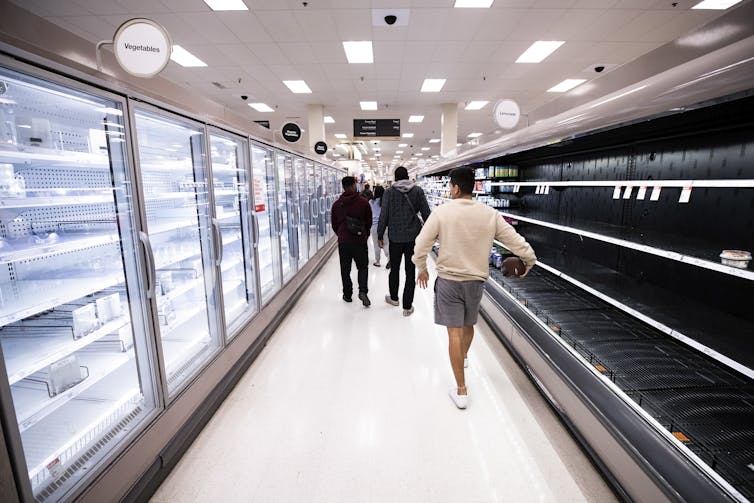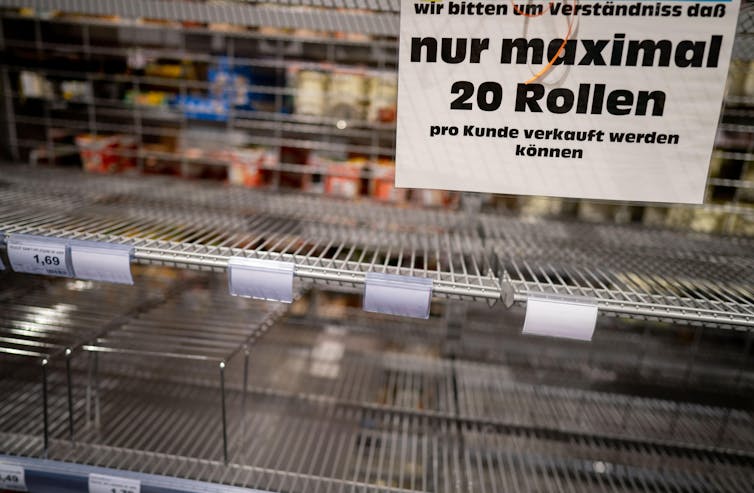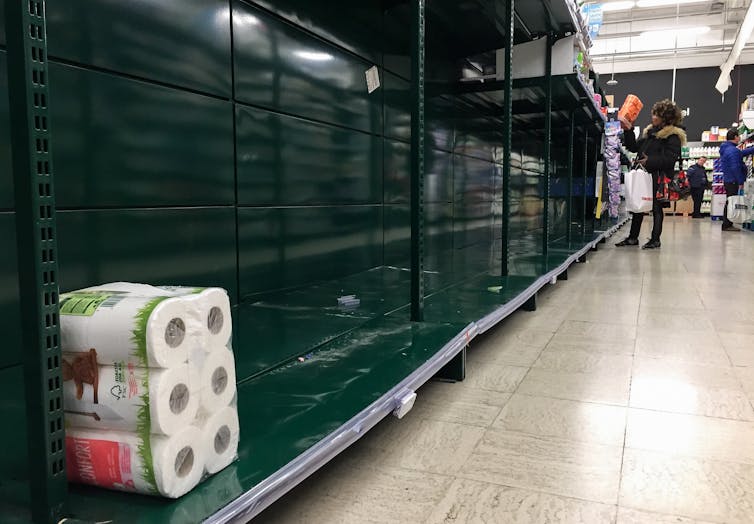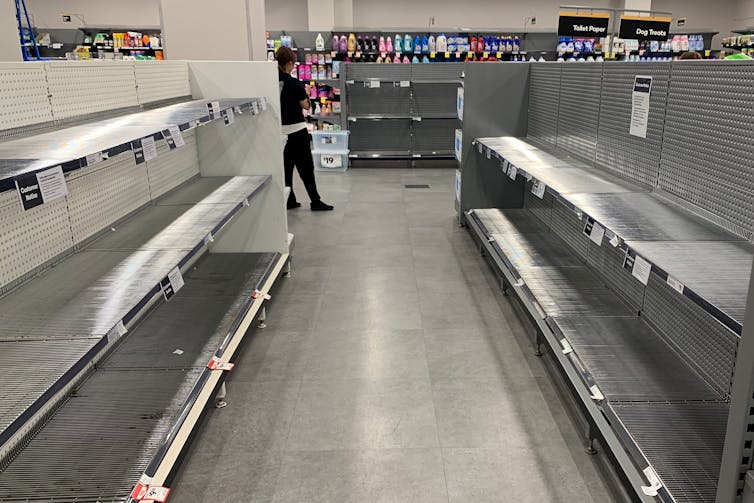Desperately seeking toilet paper, pasta or hand sanitiser? Some relief is just weeks away
- Written by Flavio Romero Macau, Senior Lecturer in Supply Chain Management and Global Logistics, Edith Cowan University
Panic buying, shop shelves emptied of toilet paper, hand sanitiser, pasta and other household supplies, supermarkets policing limits on buying products, Amazon and eBay stopping opportunists[1] from selling items at exorbitant prices. When will things get back to normal?
The good news: well before the coronavirus crisis is over.
Read more: Stocking up to prepare for a crisis isn't 'panic buying'. It's actually a pretty rational choice[2]
Usually a well-oiled supply chain guarantees no shortages or excesses in products. Products bought in the supermarket are quickly replenished, ensuring stock is always available.
Logistics for toilet paper, hand sanitiser and pasta are usually highly efficient. Companies are pleased to have lean, skinny supply chains. These products sell at low margins. For the profit they return, they can take up a lot of space in a store (as in the case of toilet paper). So distributors want to keep inventory at a minimum.
Happily, demand is usually highly predictable, so product moves slowly and continuously from factory to distribution centre to store and finally to you.
These, however, are not usual days.
 A supermarket in Los Angeles, March 16 2020.
Etienne Laurent/EPA
A supermarket in Los Angeles, March 16 2020.
Etienne Laurent/EPA
The shelves for these products (and others) are empty as everyone goes into “hoard mode” simultaneously. If a product is sold out, all you can do is wait for more to arrive. And because these supply chains are slow and unresponsive, you might also buy as much as you can the next time.
Read more: There's plenty of toilet paper – so why are people hoarding it?[3]
It is easy to see how this dynamic becomes a self-fulfilling prophecy: shelves are emptied simply because people predict they will be empty sooner rather than later.
The idea that one’s expectations drive actions that confirm the initial thought is as ancient as the Greek Oedipus in his tragic journey to become the king of Thebes and as modern as Lord Voldemort going after Lily and James Potter. Sociologist Robert Merton was among the first to bring the concept to economic behavour, noting in a 1948 paper[4]:
The self-fulfilling prophecy is, in the beginning, a false definition of the situation evoking a new behavior which makes the originally false conception come true.
 A supermarket in Berlin, March 16 2020. The signs says: ‘Only 20 rolls maximum’.
Kay Nietfeld/DPA
A supermarket in Berlin, March 16 2020. The signs says: ‘Only 20 rolls maximum’.
Kay Nietfeld/DPA
Ramping up supply
That said, a slow and skinny supply chain doesn’t mean paralysed.
The information of a spike in demand made its way from shops and distributors to manufacturers a few weeks ago. Now manufacturers, suppliers and transporters – all profit-driven – are moving to answer the call.
Their challenge is finding a balance between being too conservative and underproducing (leaving shelves empty) or being too exuberant and overproducing (getting lumbered with the cost of unsold stock). Ramping down production and distribution will take as much time as it did to ramp up.
Manufacturers and distributors, however, now have weeks of information about the degree of extra demand being put on usually very predictable supply chains. With that information, the only things stopping supply returning to normal well before coronavirus contamination reaches a peak is a major disruption to production or transportation – and so far there’s no sign that will occur.
 A supermarket in Brussels, Belgium, March 13 2020.
Stephanie Lecocq
A supermarket in Brussels, Belgium, March 13 2020.
Stephanie Lecocq
Local advantage
So which shelves will be replenished sooner? If you have a product at home, take a look at the package. Where is it made?
Local supply chains are much more responsive[5]. Products made in your country, especially in your region, will hit the shelves sooner. If the product comes from overseas, response rates are significantly different and you have to allow 10 to 12 weeks to be safe.
Does that mean you can assume – with hand sanitisers, toilet paper and pasta made in generous quantities in every country – regular stock will return sooner rather than later?
Well, no. It depends. Things become more complicated depending on whether average demand increases.
It is hard to imagine people going to the loo all that more often because of the coronavirus, so the supply of toilet paper should be back to normal quickly.
Some quick research on lead times in the toilet paper industry shows most orders are fulfilled in about 10 days (three weeks at most). There have been reports in the past week that manufacturers have increased shipping by more than 20%. So you should expect things to get back to normal within about three weeks, depending on local circumstances.
 A supermarket in Sydney, March 13 2020.
Bianca De Marchi/AAP
A supermarket in Sydney, March 13 2020.
Bianca De Marchi/AAP
With pasta, it is easy to imagine people cooking at home more rather than eating out, so there might well be an increase in consumption that adds to demand. This too, though, should be dealt with in a short time, possibly in a month or two.
For hand sanitisers, an estimate is really problematic. I’d be guessing.
Here are the complications. Greater demand for hand sanitiser should be expected for as long as the crisis continues – possibly longer. Manufacturers may reach capacity quickly. To produce more will take investment and time.
Expansion can be accelerated but still depends on new buildings, new equipment, new skilled employees and possibly new suppliers. This can’t be achieved in weeks or months. So if you haven’t seen stocks in weeks, don’t pin your hopes on things changing any time soon.
Read more: A toilet paper run is like a bank run. The economic fixes are about the same[6]
Fortunately hand sanitiser is what economists call a substitute good. It’s quite replaceable with some other form of soap. So too is pasta. You can always have noodles, or rice, or wraps, tacos and so on.
Even toilet paper has its substitutes. But all the indications are it shouldn’t come to that.
References
- ^ stopping opportunists (www.nytimes.com)
- ^ Stocking up to prepare for a crisis isn't 'panic buying'. It's actually a pretty rational choice (theconversation.com)
- ^ There's plenty of toilet paper – so why are people hoarding it? (theconversation.com)
- ^ a 1948 paper (entrepreneurscommunicate.pbworks.com)
- ^ are much more responsive (hbr.org)
- ^ A toilet paper run is like a bank run. The economic fixes are about the same (theconversation.com)
Authors: Flavio Romero Macau, Senior Lecturer in Supply Chain Management and Global Logistics, Edith Cowan University







